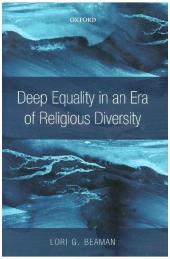 Neuerscheinungen 2017Stand: 2020-02-01 |
Schnellsuche
ISBN/Stichwort/Autor
|
Herderstraße 10
10625 Berlin
Tel.: 030 315 714 16
Fax 030 315 714 14
info@buchspektrum.de |

Lori G. Beaman
Deep Equality in an Era of Religious Diversity
2017. 244 S. 240 mm
Verlag/Jahr: OXFORD UNIVERSITY PRESS; OUP OXFORD 2017
ISBN: 0-19-880348-6 (0198803486)
Neue ISBN: 978-0-19-880348-5 (9780198803485)
Preis und Lieferzeit: Bitte klicken
A sociological study which traces deep equality by focusing on positive narratives of people working out and accepting religious differences in everyday life.
While religious conflict receives plenty of attention, the everyday negotiation of religious diversity does not. Questions of how to accommodate religious minorities and of the limits of tolerance resonate in a variety of contexts and have become central preoccupations for many Western democracies. What might we see if we turned our attention to the positive narratives and success stories of the everyday working out of religious difference? Rather than ´tolerance´
and ´accommodation´, and through the stories of ordinary people, this book traces deep equality, which is found in the respect, humour, and friendship of seemingly mundane interactions. Deep Equality in an Era of Religious Diversity shows that the telling of such stories can create an alternative
narrative to that of diversity as a problem to be solved. It explores the non-event, or micro-processes of interaction that constitute the foundation for deep equality and the conditions under which deep equality emerges, exists, and sometimes flourishes.
Through a systematic search for and examination of such narratives, Lori G. Beaman demonstrates the possibility of uncovering, revealing, and recovering deep equality-a recovery that is vital to living in an increasingly diverse society. In achieving deep equality, identities are fluid, shifting in importance and structure as social interaction unfolds. Rigid identity imaginings, especially religious identities, block our vision to the complexities of social life and press us into corners that
trap us in identities that we often ourselves do not recognize, want, or know how to escape. Although the focus of this study is deep equality and its existence and persistence in relation to religious difference, deep equality is located beyond the realm of religion. Beaman draws from the work of
those whose primary focus is not in fact religion, and who are doing their own ´deep equality´ work in other domains, illustrating especially why equality matters. By retelling and exploring stories of negotiation it is possible to reshape our social imaginary to better facilitate what works, which varies from place to place and time to time.
[T]he book is a very useful corrective to prevailing theoretical and practical approaches vis-à-vis religious identity and diversity. The reader will find the ethnographic work particularly illuminating in grounding many of the abstract theories and concepts often employed in discussions involving religious freedom and in emphasizing that deep equality depends, by and large, on people recognizing similarities in one another. Deep Equality thus significantly broadens the frame with which we view these debates, not only in terms of methodology but also substance. There is a rich world outside law, notwithstanding law´s seemingly long shadow. And it starts with the person in front of us. Anna Su, JAAR


